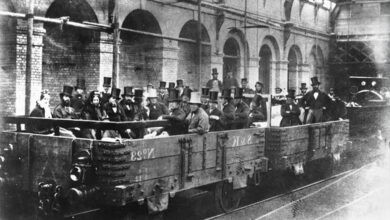December 5: holidays and events on this day

On December 5, Statistics Workers’ Day and Soil Scientist’s Day are celebrated in Ukraine, and in the world – World Soil Day, International Volunteer Day
Day of statistics workers in Ukraine
This holiday was established by the Decree of the President of Ukraine in 2002 to celebrate the important role of specialists in the collection, analysis and interpretation of data in the life of the state. The holiday is a reminder of how important accuracy, transparency and availability of data are for society. Thanks to statistics workers, we can better understand the world around us and contribute to its harmonious development.
Statistics are the basis for making balanced management decisions, because it is thanks to high-quality accounting and analysis that it is possible to assess the socio-economic state of the country, forecast the development of the economy and solve current problems. Statisticians provide reliable information for policy making, scientific research and planning activities in various fields.
Modern statistics cover many aspects — from economics and demography to ecology and the social sphere. In Ukraine, this activity is carried out, in particular, by the State Statistics Service, which coordinates the collection of official information and publishes key indicators of the country’s development.
Interesting facts
The first national statistics were introduced in Ukraine during the times of Kyivan Rus, when tribute was calculated.
In the 19th century, statistics became an important tool for the development of land management and agrarian policy.
Modern technologies have greatly simplified the work of statisticians: today, data analytics is based on complex computer algorithms and large data sets.
The UN has a separate statistical commission that works with international data standards, and Ukraine takes an active part in this work.
Without statistical data, it is difficult to imagine conducting a population census, analyzing economic growth or even sports analytics.
World Soil Day and Soil Scientist Day
World Soil Day was declared by the United Nations in 2013 to raise awareness of the importance of soils to the health of the planet. In Ukraine, on the same day, the Soil Scientist’s Day is unofficially celebrated – a national professional holiday for those engaged in soil research and conservation.
Soil is the basis of life on Earth. It supports agriculture, preserves biodiversity, regulates water cycles and absorbs carbon dioxide. Healthy soils play a key role in combating climate change and ensuring food security. However, large amounts of fertile soil are lost each year to erosion, pollution, and overuse.
Ukrainian soil science has a rich history. The outstanding scientist Vasyl Dokuchaev, who is considered the founder of modern soil science, made a significant contribution to the study of soils, their classification and preservation. In Ukraine, soil scientists are working on research and protection of chernozems — one of the most fertile soils in the world, which is the country’s national wealth.
Interesting facts
Ukrainian chernozems are considered the best soils for growing agricultural crops and occupy about 60% of the country’s territory.
It takes 100 to 1000 years to form one centimeter of soil, but it can be lost in just a few years of improper use.
Soil is the largest “living organism” on the planet: one gram of soil contains more living microorganisms than there are people on Earth.
Vasyl Dokuchaev was the first to prove that soils are not just a part of rock, but a special natural formation that depends on climate, vegetation and time.
International Volunteer Day
This holiday was established by the United Nations in 1985 as a recognition of the important role of volunteers in society. On this day, people are honored who selflessly help others, participate in charitable initiatives and change the world for the better.
Volunteering is not only about helping those who find themselves in difficult life circumstances, but also a powerful tool for solving global challenges, such as poverty, environmental problems, education or health. Volunteers contribute to building a solidary society by spreading the values of mutual aid, kindness and humanity.
Interesting facts
The holiday was approved by the UN General Assembly in 1985. Since then, this day has become a symbol of recognition of volunteer work all over the world.
According to the UN, there are more than 1 billion volunteers on the planet who work in various fields: from medicine to ecology.
Ukraine has a powerful volunteer movement, which is especially active in times of social crisis. Volunteers play an important role in supporting the army, helping displaced people and victims of military operations.
Volunteers often work in dangerous conditions, such as in conflict zones or during natural disasters, providing life-saving assistance.
Research shows that people who volunteer regularly have a higher level of life satisfaction because they feel needed and useful.
Historical events on this day
1766 – Christie’s first auction
James Christie Sr., a former naval officer, held his first auction in London. This was the beginning of the history of the Christie’s auction house, which is now one of the most famous in the world along with Sotheby’s”. Today, Christie’s sells masterpieces of art, rare books, jewelry and other luxury items, setting high standards in the field of art auctions.
1848 – The beginning of the Gold Rush
US President James Polk officially confirmed the discovery of gold in California, which triggered a massive wave of migration to the region known as the Gold Rush of 1849. Thousands of people from all over the world moved to California in search of wealth, which affected the economic development of the region and the United States in general.
1918 – Proclamation of the Russian People’s Republic of Lemki
On December 5, 1918, the Russian People’s Republic of Lemki was proclaimed on the territory of modern Poland, a state entity that sought to join Ukraine. However, its existence did not last long due to political and military pressure.
1919 – Simon Petliura leaves Ukraine
Chief Ataman of the troops of the Ukrainian People’s Republic Simon Petliura, under the pressure of the offensive of enemy armies, left Ukraine and went to Poland. This event became a turning point in the liberation struggle of Ukraine for independence in that period.
1931 – Destruction of the Cathedral of Christ the Savior
In Moscow, the Bolshevik authorities blew up the Cathedral of Christ the Savior, one of the main Orthodox shrines in Russia. This act became a symbol of the struggle of the Soviet regime against religion. Only a decade later, the temple was restored.
1944 – Conscription of women in Germany
Against the backdrop of grueling losses during the Second World War, Germany announced a general conscription of women over the age of 18 into the army. This decision was a response to the critical shortage of human resources in Nazi Germany.
1949 – Jerusalem as the capital of Israel
Israel’s parliament has declared Jerusalem its capital. This event became a historical milestone for the state of Israel, although the status of the city remains controversial on the international stage to this day.
1971 – Monument to Taras Shevchenko in Argentina
A monument to the great Ukrainian poet Taras Shevchenko was unveiled in Buenos Aires, the capital of Argentina. This symbolizes respect for his work and legacy among the Ukrainian diaspora in Latin America.
1991 – Recognition of Ukraine’s independence
At once, five countries — Argentina, Bulgaria, Bolivia, Russia and Croatia — officially recognized the independence of Ukraine. This event was an important step in the international development of Ukraine as a sovereign state.
2001 – All-Ukrainian population census
The first All-Ukrainian population census in its history began in Ukraine. Its results became the basis for the formation of state policy in the demographic and socio-economic spheres.
2017 – Elimination of Russia from the Olympics
The Executive Committee of the International Olympic Committee (IOC) completely removed the Russian national team from participating in the 2018 Winter Olympic Games in Pyeongchang due to the doping scandal. This decision became a precedent in sports history.
December 5, 1949 Jerusalem was officially declared the capital of the State of Israel. The Knesset (Israeli parliament) and most state and government institutions are located in this city. Later, in April 1950, Jordan also declared Jerusalem as its second capital. This led to the division of the city, with the western part under Israeli control, while the eastern part was under Jordanian control.
From the very beginning, the question of the status of Jerusalem caused controversy in the international arena. According to UN General Assembly Resolution 51/27 of December 4, 1996, Israel’s actions to establish its laws, jurisdiction and administration in Jerusalem are declared illegal and void. The Tenth Special Emergency Session of the UN General Assembly in 2004 confirmed that all measures taken by Israel that changed or were intended to change the character, legal status and demographic composition of the city remain invalid.
Jerusalem is a holy city for three world religions – Judaism, Christianity and Islam. Its historical and spiritual significance makes the city’s status a particularly sensitive issue in international politics. Despite legal restrictions, Israel has maintained administrative control over all of Jerusalem since the 1967 Six-Day War, when it occupied the eastern part of the city.
On December 6, 2017, US President Donald Trump made a sensational statement, officially recognizing Jerusalem as the capital of Israel. This move caused concern of the European Union and many other countries, which saw it as a threat to peace talks in the region. At the same time, the USA announced the transfer of its embassy from Tel Aviv to Jerusalem, which took place in May 2018.
Despite international criticism and legal disputes, Israel considers Jerusalem its indivisible capital. However, a large part of the international community does not recognize this status, insisting on the need to resolve the conflict through negotiations between the Israelis and the Palestinians. The Palestinian Authority continues to consider East Jerusalem as the future capital of its state. Jerusalem remains a symbol of religious, political and cultural significance, and its status remains one of the key issues in the Middle East peace process.
December 5, 1994 in Budapest, Ukraine, Russia, the USA and Great Britain signed a historic document – the Budapest Memorandum, which was supposed to guarantee Ukraine’s security in exchange for its renunciation of its nuclear arsenal. At that time, Ukraine possessed the third largest nuclear potential in the world, which it inherited from the USSR.
They promised to sign the memorandum:
- Respect the sovereignty and territorial integrity of Ukraine, including its borders.
- Refrain from threats of force or its use against Ukraine.
- Not to apply economic pressure that could violate its sovereignty.
- In the event of a nuclear threat to Ukraine, appeal to the UN Security Council with a demand to take measures.
- In case of controversial situations affecting the obligations of the memorandum, conduct consultations.
In addition to the signatories of the memorandum, other nuclear powers — France and China — also expressed support for Ukraine by providing security declarations. However, their documents did not include an obligation to consult in the event of threats.
As part of the agreements, Ukraine received: 500 million dollars from the United States and nuclear fuel for nuclear power plants from Russia in the amount of 160 million dollars.
The Budapest Memorandum caused a lot of controversy, in particular due to the vagueness of the wording. The English text of the document uses the word “assurances” (assurance), not “guarantees” (guarantees). This indicates the lack of legally binding force of the document. Moreover, the memorandum did not contain a specific action mechanism in case of violations. Already in 2013, the USA officially declared that the memorandum is only a political commitment and has no binding legal force.
Russia’s actions in 2014, when it annexed Crimea and started a war in Donbas, became a direct violation of the obligations of the Budapest Memorandum. However, the reaction of the guarantor countries turned out to be limited, being limited mainly to diplomatic protests and sanctions.
In 2018, the second president of Ukraine, Leonid Kuchma, called the abandonment of the nuclear arsenal one of the biggest strategic mistakes of independent Ukraine, along with the loss of opportunities after the Orange Revolution and the coming to power of Viktor Yanukovych.
December 5, 2009 in Kharkiv, the reconstructed stadium “Metalist”, which became one of the most modern football facilities in Ukraine. The opening ceremony was attended by leading politicians of the country, including President Viktor Yushchenko, head of the presidential secretariat Vira Ulyanchenko, Minister of Family, Youth and Sports Yuriy Pavlenko, as well as leader of the Party of Regions Viktor Yanukovych.
The official part began with the singing of the national anthem of Ukraine, after which the floor was given to President Viktor Yushchenko. However, his performance was accompanied by whistles from the stands. All guests of the ceremony were dressed in scarves with the symbols of the football club “Metalist”, showing support for the local team.
After reconstruction, the stadium can accommodate 40,003 spectators. It became part of the infrastructure prepared for holding Euro-2012 matches, emphasizing the status of Kharkiv as one of the key cities of Ukrainian football.
Metalist Stadium has a rich history. Its construction began in 1925 on the initiative of Anastas Mikoyan, a member of the Central Committee of the All-Union Communist Party of Ukraine (b), during whose work Kharkiv was the capital of the USSR. The opening of the stadium took place on September 12, 1926, and its initial name was “Tractor”. At that time, the stadium could accommodate only 5,000 spectators.
During its history, the “Metalist” stadium changed owners several times. In 2018, the Cabinet of Ministers of Ukraine transferred the facility to the ownership of the Kharkiv Regional State Administration. However, there are rumors that some parts of the stadium’s infrastructure continue to be used by third parties.
The “Metalist” stadium is an important part of the sports life of Kharkiv. Its reconstruction in 2009 became a symbol of modernity and the revival of football culture in the region. Despite all the challenges associated with changes in ownership and management, “Metalist” remains an iconic place for football fans and residents of Kharkiv.
December 5, 2017 One of the loudest political events in Ukraine took place: the attempted arrest of Mykhailo Saakashvili, a Georgian and Ukrainian political figure, former president of Georgia and ex-head of the Odesa Regional State Administration. That day, Saakashvili was detained in Kyiv by Ukrainian law enforcement officers. However, he was “lost” during transportation – the politician’s supporters prevented the law enforcement officers and literally took Saakashvili out of custody.
This event was only the beginning of a series of high-profile incidents related to Saakashvili. On December 8, 2017, he was detained again, this time by the Security Service of Ukraine. He was accused of aiding and abetting criminal gangs, which sparked outrage among his supporters and caused a political uproar.
On December 11, 2017, the Pechersk District Court of Kyiv decided to waive Saakashvili’s arrest for the duration of the investigation, which allowed him to remain free. However, already on February 12, 2018, Mykhailo Saakashvili was deported from the territory of Ukraine. He was sent to the Netherlands, where he lived with his wife’s family.
Despite the deportation, Saakashvili repeatedly declared his intention to return to Ukraine. And he fulfilled his promise: later he returned, although this time to Odesa, the city where he previously held the position of head of the regional state administration.
This story became a symbol of political battles and controversial decisions in Ukrainian politics, at the same time emphasizing the charismatic and unpredictable character of Mykhailo Saakashvili.





